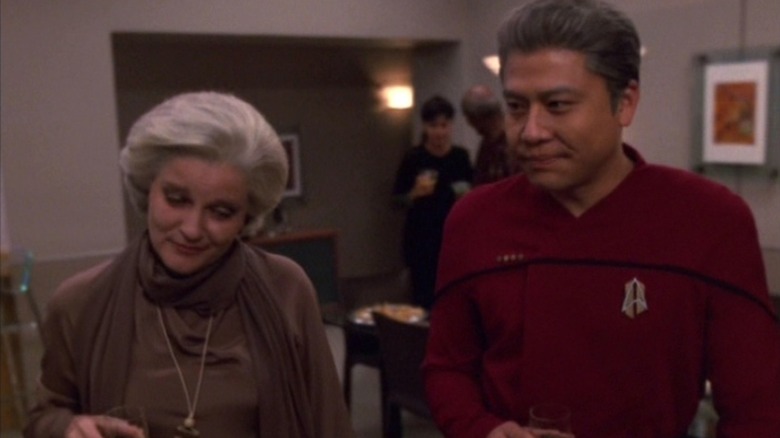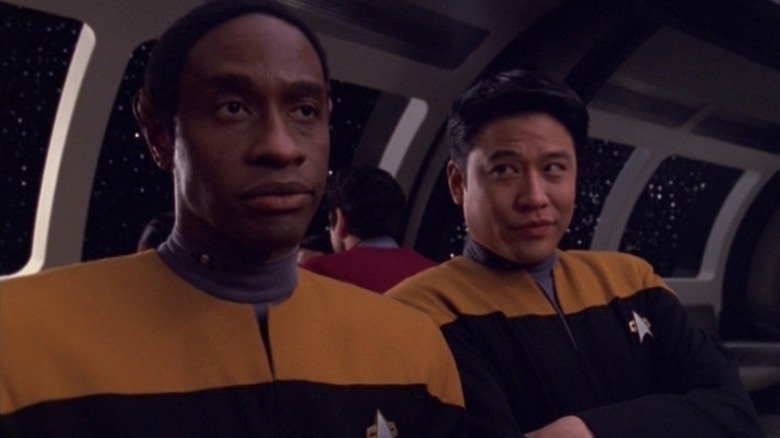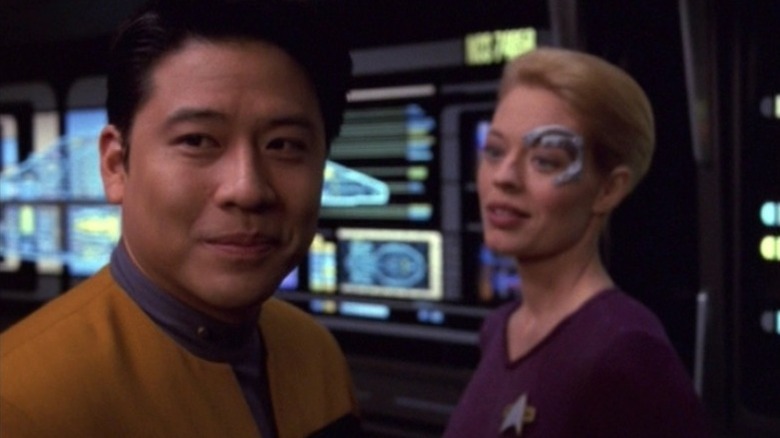
The final episode of “Star Trek: Voyager” was called “Endgame,” and it began with a flash-forward to the year 2404, ten years after the U.S.S. Voyager returned to Earth in 2394. For context, “Voyager” began in the year 2371, so by the timeline of “Endgame,” it took the title ship about 23 years to return home from the Delta Quadrant. By 2404, some of the old “Voyager” crew had all settled into cushy new jobs. Notably, Harry Kim (Garrett Wang) was finally a starship captain. Kim’s promotion was well-deserved, as he had spent his entire stint on the U.S.S. Voyager as a mere ensign. He was never promoted as a way to retain a certain sense of status quo.
The plot of “Endgame” follows the now-admiral Janeway (Kate Mulgrew) realizing that 23 years wasn’t fast enough, and that she could have done a better job getting her crew home. As such, she travels back in time — with Captain Kim’s kelp — to give her younger self a high-tech advantage. Older Janeway assures that the Voyager’s trip would only take seven years, all told. Yes, it’s very irresponsible of older Janeway to muck around with her own timeline like that, and there is some discussion of older Janeway’s shaky ethics.
“Endgame” is a fine ending to “Voyager,” and most Trekkies appreciate the way the series ended. The ship returned home, fulfilling the show’s ultimate goal.
Garrett Wang, however, was still uneasy with the events of “Endgame” a decade after the fact. In 2011, Wang was interviewed by StarTrek.com, and he criticized the finale for its bad pacing, and for its lack of a certain notable visual. Most notably, Wang was upset that there were no shots of he and his fellow Voyager crew exiting the ship and setting foot on Earthen soil.
Garrett Wang didn’t like the pacing of Endgame
Wang noted that all the of “Endgame” scenes set in 2404 were fine, and he liked the idea of flashing forward to how the ship’s crew was living a decade after their return. He likely appreciated that Harry Kim hadn’t just been promoted, but rose to the rank of captain quite swiftly. Personally, I also liked that life wasn’t so rosy for some of the Voyager’s crew in 2404. Tuvok (Tim Russ) had succumbed to a rare form of Vulcan dementia, as he wasn’t able to receive proper treatment in the Delta Quadrant. Chakotay (Robert Beltran) was despondent after the death of Seven of Nine (Jeri Ryan). It was the lack of a mega-happy ending that inspired Janeway to go back in time and help herself do it better.
But, Wang noted, the back half of “Endgame” was rushed. He also didn’t like that Voyager’s actual return didn’t feature a scene of the characters on Earth; the final shot of the series was of the U.S.S. Voyager in orbit around the planet. As Wang said:
“I think the first hour of the finale was fantastic, very exciting, well written, good pacing. Everything was great about the first hour, but then the second hour it just seemed like it tied up all of the loose ends very quickly. So, the second half of the finale I was not happy about, and I especially didn’t like the fact that we ended the series in Earth’s orbit. We don’t even step foot on Earth. Hello! After seven years, I think the fans wanted to see us actually step foot on terra firma.”
Wang has a point. After seven years of obsessive travel back to Earth, the showrunners didn’t have the decency to depict the characters, in the show’s present, actually on the surface.
If Garrett Wang was running Voyager, he would have made it bigger and more ambitious
Trekkies will be able to tell you that Admiral Janeway did appear on the big screen, when she had a brief conversation with Captain Picard (Patrick Stewart) in the 2002 film “Star Trek: Nemesis.” Garrett Wang, however, would have wanted the “Voyager” characters to reach into cinemas much more extensively. Indeed, if Wang had his way, he would have ended “Endgame” on a cliffhanger, and then continued the story … in a “Star Trek: Voyager” feature film. He said:
“If I was running ‘Star Trek: Voyager,’ what I would have done is keep the first hour exactly the way it was and, the second hour, I would have taken the same kind of pacing as the first hour and then ended it with a caption on screen saying, ‘To be continued at a theater near you.’ Then I would have done a two-hour feature film. That would have been the way I would have done it.”
Of course, by 2002, “Star Trek” was waning in cultural ubiquity, as “Nemesis” was a bomb and ratings for the then-concurrent “Star Trek: Enterprise” were consistently low. There just wasn’t money or interest for a “Voyager” movie. Wang would not have gotten his wish.
Which is not to say that a “Voyager” movie wouldn’t have been interesting. A feature film would have allowed for a larger, more expansive story, even grander than a flash-forward to 2404. Audiences wouldn’t learn what happened to the U.S.S. Voyager until many years later.
Personally, I would have loved to see a tragic ending for “Voyager.” Perhaps the ship, after its seven-year voyage, begins pulling closer and closer to Earth, only to suddenly be magically whisked away back to the Delta Quadrant — or even further away — once again. The ship is doomed to approach Earth eternally, and never actually arrive. Sad, yes, but darkly poetic.




Leave a Reply